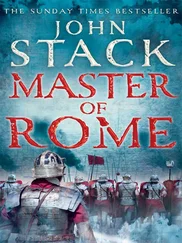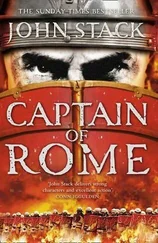Demades had passed the entire journey in his cabin. At first the confinement was imposed and his demands for his release had gone unanswered through the bolted cabin door. Hours out of port, Cronus had finally opened the door. Demades had immediately renewed his protests, calling for the ship to return to Lipara, but the guard commander had simply ignored him. Without a word he had walked away, leaving the door open. On a hostile galley, isolated at sea, a locked door was pointless. Demades had slammed the door shut in defiance and it had remained that way for the rest of the journey.
Demades’s initial thoughts had dwelt on the injustice of his plight. His bitterness and sense of hopelessness soon gave way to fear, not only of Cronus and the words Gisco had spoken, but also fear of the Romans. He realized the Carthaginians were setting some kind of trap for the Romans and, although he had no idea what form that trap would take, he knew that his city was the bait. As the presenter of that lure, Demades’s involvement would be synonymous with the trap. He was caught between the two opposing forces and the realization made him sick to his stomach. Whichever course he took, if he betrayed the Carthaginians to the Romans or the Romans to the Carthaginians, his life and the lives of his family would be forfeit if he did not find a way to avoid his fate.
Atticus watched Gaius swing the rudder to port and the Aquila turned neatly around the headland into the harbour at Ostia. The helmsman straightened the tiller and adjusted the ship’s trim to line her up with the castrum , now crowded with the twenty galleys of the newly formed Classis Romanus , the Fleet of Rome.
The activity of the traders and merchants of the port seemed reinvigorated at the sight of the anchored fleet, as if its very presence had eradicated the Carthaginian threat in the south, and ships sailed purposefully and confidently out under the offshore breeze for the far-flung ports of the Mediterranean. The Aquila ’s course took her through some of the busiest parts of the harbour, but rather than before when the Aquila had had to weave her way between ships, those same ships now changed their course to make way for the military galley.
Atticus had been ordered to Ostia by Tuditanus to further the training of the command crews of the new fleet, a task he did not relish given that those same trainees were now captains in their own right and not subject to Atticus’s orders. He had a feeling they would not be as responsive as they had been before and, given that some had been blatantly uncooperative in the first place, their further training relied almost completely on any respect they had for his experience, a respect he knew in some cases did not exist.
Septimus was also in Ostia, having joined his optio , Quintus, the day before and, as the Aquila approached the dockside, Atticus could see the familiar figure of the centurion standing beside his opposite number from the V maniple of the Fourth.
The day’s training would involve teaching boarding techniques to the legionaries under the guise of demonstrating how the Carthaginians boarded enemy galleys. It would be the legionaries’ first taste of boarding, albeit in calm waters and without heavy battle armour, but it would be realistic, and the hope was that this realism would speed the training process. As the Aquila docked, the gangway was lowered to allow the men on board. They tramped up the gangway in single file. None seemed enthusiastic about the day ahead.
One hundred yards away, the ship bearing the men from Lipara reached the crowded docks. Cronus stood at the head of the gangway with the barge’s captain.
‘If we do not return you are to sail directly to Lipara and inform the admiral that we have been betrayed.’
The captain nodded as Cronus turned to Demades. ‘Remember, Demades, that although you will have the opportunity to betray us once we are in the city, you will not be able to stop this barge from sailing with news of that betrayal. If the admiral receives such a message, your family will be immediately killed.’
Demades nodded, his fear and understanding evident. Cronus disembarked, followed by the sullen and silent Demades and then four of Gisco’s, now Demades’s, personal guard. Once they were ashore, the gangway was raised and the ship shoved off from the busy quayside to allow another ship to moor in her place.
‘Wait here,’ Cronus ordered, and strode off alone towards a livery to hire horses for the journey to Rome.
Demades stood in the centre of the four men, cut off from the frantic world around him by the constantly vigilant guards. As his eyes roamed over the teeming waters, he caught sight of a galley sailing apace into the castrum. His breath caught in his throat at the sight, his heart rate increasing as he recognized the pennant flying at the masthead. It was an eagle in flight, the namesake of the galley it soared above.
‘The Aquila ,’ he breathed to himself, his mind racing, scarcely believing what he was seeing. Demades had not seen the galley in over two years, ever since Lipara had fallen into Carthaginian hands. The city had always been a prime target for the pirates who sailed the northern shores of Sicily, and so the Aquila had always been a welcome sight in the city’s harbour, so much so that Demades knew the captain of the Aquila well.
‘Let’s go.’
The abrupt command broke into Demades’s thoughts and he turned to see Cronus tower over him again. The Carthaginian grabbed the councillor by the arm and led him through the crowd towards the livery. Demades was forced to walk briskly to keep up with the taller man’s stride; although the pace made it difficult for him to look back over his shoulder, Demades could not resist the temptation. The sight of the galley produced a tiny flicker of hope in him, a flame he nursed on the headlong gallop to Rome.
Scipio sat in silence as Duilius made his rebuttal. He was impressed with the junior consul, an emotion he rarely felt, but one he believed was warranted given the item being debated. Scipio was not involved in the debate itself, but he had surreptitiously engineered its acceptance on the agenda, something he was very pleased with given the awkward position it put Duilius in.
The Senate was debating the levying of taxes to fund the construction of the new fleet, specifically, in this case, the application of a new tax on produce sold in the markets. If effected, it would be diplomatically called the ‘rescue tax’, in reference to the legions trapped behind the blockade in Sicily, a name the Senate hoped would make the tax more palatable to the populace. It would be a tax that would be borne in part by the buyer and in part by the vendor. As Duilius was the largest merchant in the city, he stood to lose a great deal of money if the tax was passed, especially if the vendor was chosen to pay the greater part. This put Duilius in a no-win situation. If he opposed the tax he would be seen as unpatriotic. If he let it pass without conditions he would end up paying a huge portion of the costs of the new fleet. To watch the political balancing act that Duilius was now forced to perform gave Scipio immense satisfaction.
As the junior consul retook his seat, another senator stood to address the chamber and the debate continued. It was then that Scipio’s eye caught Longus moving across the chamber towards a man who had just appeared at the entrance to the Curia. Scipio watched the two in conversation, remembering the junior senator well and the contrived speech he had given that had started the ten-day-long debate on the decision to build the fleet.
‘Councillor Demades?’ Longus said as he approached the man, confirming his recognition of the familiar figure he had spied from across the chamber.
Читать дальше
Конец ознакомительного отрывка
Купить книгу











